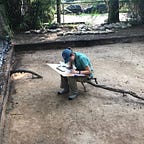Cheikh Anta Diop
Welcome to the publication, “Representations.” This is a project designed to bring the perspectives of a wider variety of groups to the forefront of the anthropology classroom. To celebrate Black History Month, we are covering the accomplishments of 28 Black anthropologists across 28 days. Learn more about our project; read on for the amazing accomplishments of Cheikh Anta Diop.
Dr. Cheikh Anta Diop (1923–1986) was a prominent scholar in pre-Colonial pan-African culture formation and a fierce advocate for a unified African nation. He is remembered as being a vocal and passionate scholar for African social and historical self-sovereignty, with a focus on Egyptology and working to prove the country’s Black African heritage.
Dr. Diop was Born in Senegal to an upper-class Wolof family and was schooled in an institution matching his family’s Muslim religious practice, attending a customary Islamic school. After receiving his undergraduate diplomas in Senegal, he moved overseas to attend the University of Paris, Sorbonne.
While there, he pursued several disciplines — physics, history, mathematics, chemistry, philosophy, art history, and anthropology. He earned multiple degrees in mathematics, physics, history, and philosophy. After spending his initial schooling in the sciences, Dr. Diop found his home in the humanities — seeking to learn and discover more about the landscapes, developments, and sociality of classical-period Africa, a time of dynamic revolution and cultural emergence into the world. His work, focused mainly on pre-colonial Africa and the origins of humanity, contributed greatly to the burgeoning theories of the development of African civilization and its contributions to the world over. Doing so, Dr. Diop focused on Egypt and its Black African history — investigating its developments and history prior to the colonial systems of oppression and appropriation that came into power.
Through his work, Dr. Diop worked to showcase African contributions to the world through its internal exceptionality and external connections to other great countries, reclaiming accomplishments and histories that were pilfered by European interlopers. Even with all his accomplishments and scholarly contributions — Dr. Diop was repeatedly denied his “doctor of letters” because no one at the Sorbonne would participate as his “jury of examiners” (DISA, n.d.). His first doctorate — which stated that Egypt was originally inhabited by Black Africans, thus attributing Egypt’s impact on the world to Black Africans — was turned into a book after being rejected by the Sorbonne. Negro Nations and Cultures (1955) received much attention from scholars throughout the world. Dr. Diop continued to work towards gaining his doctorate but it wouldn’t be until 1960, with his third project submission, that the Sorbonne would pass him recognizing his scholarship after critical acclaim for his work.
After receiving his degree, Dr. Diop returned to Senegal which had recently become independent from French rule. During his work there, Dr. Diop joined the University of Dakar after having been appointed a research fellow at the Fundamental Institute for Black Africa (IFAN). As a research fellow, Dr. Diop began the first radiocarbon dating lab in Africa (Biographical & Bibliographic milestones, n.d.). In 1980, six years before his untimely death, Dr. Diop was appointed a professor of ancient history and went on to publish multiple works speaking to the roots of early Africa, working to disassemble the Western theoretical claims that had been insidiously embedded to doubt and undermine the impact of Black Africa on the development of World Civilization.
Throughout his academic and personal life, Dr. Diop was a strong and renowned political activist and leader. From 1950–1953, while studying at the Sorbonne, he held office as the Secretary-General for the Rassemblement Democratique Africain (RDA) — a political party of French West Africa endeavoring towards the decolonization of Africa (DISA, n.d.). During the first year of his program, he helped to create the Pan-African Student Congress, bringing together other his peers (Diop, n.d.). Later, when back in Senegal, Dr. Diop founded the Bloc des Masses Senegalaises (1961) and later the Sengaglese National Front (1963) after the former was dissolved by President Leopold Sedar Senghor, the first president of Senegal after liberation from France. These are multiple other instances of Dr. Diop’s political prowess and activism that still impact Senegal to this day.
A distinguished physicist, an established historian, and a prominent anthropologist and archeologist, Dr. Diop created space for himself in the Western academic world where it was not before. He helped to create an academic realm focusing on Africa and its resources through a non-Western stance. He helped to strengthen strides towards African unification in his time.
In 1987, only a few months after his passing, the University of Dakar — the institution in which he established his lab — renamed the institution to “Cheikh Anta Diop University” (Blackpast, 2009). In doing so, not only has Dr. Diop been memorialized — but the message for a liberated, united Africa was strengthened and made more visible to scholars from around the world.
Bibliography
Biographical & Bibliographic Milestones. (n.d.). Cheikh Anta Diop. http://www.cheikhantadiop.net/cheikh_anta_diop_biograph.htm
Cheikh Anta Diop University (1957 — ). (2009, Mar. 8). Blackpast. https://www.blackpast.org/global-african-history/cheikh-anta-diop-university-1957/#:~:text=A%20few%20months%20after%20the,preeminent%20researchers%20of%20the%20IFAN
Diop, Cheikh Anta. (n.d.) International Dictionary of Intellectual Historians. http://idih.hab.de/HF-d-sample-diop.htm
Diopian Institute For Scholarly Advancement. (n.d.) Cheikh Anta Diop. https://www.diopianinstitute.org/index.php/about/cheikh-anta-diop
